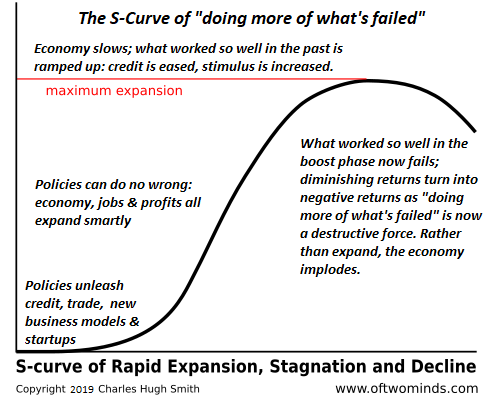"Only Half Gone"
by Jim Kunstler
“The Democrats are self-immolating on the altar of
their own tenuous relationship with common decency.”
- Tom Luongo
“Life imitates art,” Oscar Wilde was fond of saying. And so, all of a sudden on Sunday, the USA became an episode of Veep, after President “Joe Biden” had that fateful sit-down with God he’d hinted at a week or so ago:
God: Yeah, it’s me again. What I told you ‘bout dis ‘lection bidness?
“JB”: (cough cough) I gotta finish the job. (cough cough.)
God: Job, my ass. You ain’t done nuttin’ but eat ice cream cones, spend money dat don’t exist, and sniff up every chile come near you.
“JB”: No, you don’t understand! I’m defending democracy.
God: Oh yeah? Since when my will subject to some pissant caucus? In my mansion dey’s many doors, and this one is da exit, son. What I say, go. And when I say, ‘go,’ dat mean you git yo’self gone! I done wrote the letter and you signin’ on da dotted line right now.
“JB”: What if I won’t?
God: I’ma have to smite yo’ ass.
“JB”: Well, since you put it that way...but, say, do you happen to also have that pardon document we talked about?
And so it went in the study at Rehoboth Beach Sunday afternoon. And all of a sudden, Veep Kamala Harris is elevated to be the putative nominee of the Party of Chaos going into the August convention. Most of the other talked-about replacements instantly endorsed her - Gavin Newsom, Gretchen Whitmer, Pete Buttigieg, et al. - as a convocation of mullahs might bless a goat about to be sacrificed. Kamala issued a stirring war cry: “Together, we will fight. And together, we will win.” Yawn...
It was all pretend, of course, or, shall we say, a continuation of the pretend that is the core operating principle of the party. Everything it does is fake. Case in point, the marvelous statement by HRC (a.k.a. She-Whose-Turn-it-Ever-Is or Rodan the Flying Reptile), who put out this smarmy gem: "President Biden has capped his extraordinary career of service with a Presidency that has lifted America out of an unprecedented pandemic, created millions of new jobs, rebuilt a battered economy, strengthened our democracy, and restored our standing in the world. By any measure, he has advanced our founders’ charge to build a more perfect union and his own stated goal of restoring the soul of our nation.”
“Joe Biden” did all that? Hillary, you see, is buttering up the cloacal vent of the party so that she can wriggle up there and eat its brain, like one of those parasitical wasp larvae that get into a caterpillar. She’s supporting Kamala until it becomes opportune not too, which is to say when the Deep State blob gets the heebie-jeebies about failing to steal the election, losing its positions of power and perqs, and very possibly facing prosecution for serious crimes. Of course, the weekend developments suggest that “Joe Biden” will have to vacate his position as Commander-in-Chief altogether. It’s too self-evident to even rehearse the particulars. It’s only a matter of when, and that probably hinges on his negotiated severance package - basically something that keeps his various family members out of prison. Kamala will then rise to the Oval, ha ha ha.
In this moment of maximum uncertainty, then, the Party of Chaos will pretend to go along with Ms. Harris for a week or two, allowing the first woman president of-color many chances to utter world-scaring inanities and fall into cackling fits so as to demonstrate she can’t possibly be taken seriously. Suddenly you will see the long knives come out slicing and dicing Kamala like a daikon radish on the hibachi table, and anyone else besides HRC who dares to step up will get the same treatment. Notice that Mr. Obama, Nancy Pelosi, Hakim, and Chuck (Nine-Ways-From-Sunday) Schumer haven’t chimed in for Kamala. They will, by God, get their convention free-for-all, though every bit of it will be scrupulously managed by the Big Dawgs. And out of that pandemonium will fly the indomitable Hillary, screeching, “Caw caw, abortion! Caw caw, Russia!” Could it work? No way. In a truly fair election, Hillary would be run over by the Trump-Vance convoy and left a bit of smoldering roadkill, drawing flies, a sad end to all that coruscating ambition.
Not to change the subject too abrubtly, but here goes...have you caught that little convo on YouTube between George Gammon and Robert Barnes on the Trump assassination attempt? Woo-wee, this one will rock your weltanschauung. Here it is in a nutshell: "The attempted rub-out at Butler, PA, (Mr. Barnes theorizes) was a NeverTrumper/blob/neo-con joint operation that was supposed to work as follows: Nikki Haley and Mike Pompeo, Deep Staters both, are on the outs with a GOP solidifying around Mr. Trump. Before the Milwaukee GOP Convention opens, they are chatting-up delegates in preparation for a kind of coup. The Butler, PA, op is timed before any nomination can occur. It’s (obviously) intended to eliminate the former president for once and for all and make sure there’s no veep candidate to step into his shoes. The blob then blames the Trump assassination on Iran, instantly conjuring up a fresh new war to distract the nation. The GOP Convention nominates war goddess Nikki for president and Pompeo for veep. The DC war party carries on in triumph. Fait accompli.
Notice, Mr. Barnes says, that CNN and other news networks that usually avoid broadcasting Trump rallies, are actually covering the Butler, PA, event live. They want all of America to see Donald Trump’s head explode like a Crenshaw melon on TV - sending the message: this is what happens to anyone who challenges the blob. Many other observers and investigators unconnected with the government are busy looking into the site forensics, lines of fire, shot acoustics, the strange facts around the alleged “shooter” (possibly patsy) Thomas Matthew Crooks, the stupendous failures of the Secret Service. A picture is resolving.
The old Sicilian adage goes, revenge is a dish best served cold. Surely, Mr. Trump knows a thing or two about what really went down July 17. His adversaries know he knows, and he knows they know he knows. Notice Mr. Trump is not jumping up and down going woo-woo-woo over all this. Rather, he’s sitting tight and calmly and holding his cards close to his chest. He will eventually be coming to settle accounts. So, you must suppose they’ll try again. Or figure out a way to postpone the election indefinitely. Nothing is beneath these fiends. Strangely - a lot of people have noticed - it seems that God is on our side. Stand by and keep your hats on."
















.jpg)





